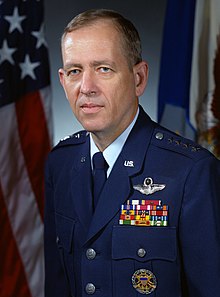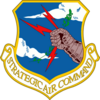Larry D. Welch: Difference between revisions
Rescuing 2 sources and tagging 0 as dead. #IABot (v1.6.1) |
|||
| Line 32: | Line 32: | ||
After completing the [[Armed Forces Staff College]] in July 1967, he was assigned to Headquarters U.S. Air Force, Washington, D.C., under the assistant [[Chief of staff (military)|chief of staff]] for studies and analysis. Upon graduation from the [[National War College]] in July 1972, he was assigned to [[Tactical Air Command]], where he served in [[Wing (air force unit)|wing]] deputy commander for operations, vice commander and wing commander positions. |
After completing the [[Armed Forces Staff College]] in July 1967, he was assigned to Headquarters U.S. Air Force, Washington, D.C., under the assistant [[Chief of staff (military)|chief of staff]] for studies and analysis. Upon graduation from the [[National War College]] in July 1972, he was assigned to [[Tactical Air Command]], where he served in [[Wing (air force unit)|wing]] deputy commander for operations, vice commander and wing commander positions. |
||
In August 1977, he transferred to Headquarters Tactical Air Command where he served as [[inspector general]], deputy chief of staff for plans and deputy chief of staff for operations. In June 1981, he became commander of the [[Ninth Air Force]] and Air Force component commander for the [[Rapid Deployment Joint Task Force]]. In November 1982, he was assigned as deputy chief of staff for programs and resources at Air Force headquarters and became vice chief of staff of the U.S. Air Force in July 1984. From August 1985 to June 1986, he served as commander in chief, [[Strategic Air Command]], and director, Joint Strategic Target Planning Staff, [[Offutt Air Force Base]], [[Nebraska]]. He became [[Chief of Staff of the United States Air Force]] in July 1986. Welch is one of only |
In August 1977, he transferred to Headquarters Tactical Air Command where he served as [[inspector general]], deputy chief of staff for plans and deputy chief of staff for operations. In June 1981, he became commander of the [[Ninth Air Force]] and Air Force component commander for the [[Rapid Deployment Joint Task Force]]. In November 1982, he was assigned as deputy chief of staff for programs and resources at Air Force headquarters and became vice chief of staff of the U.S. Air Force in July 1984. From August 1985 to June 1986, he served as commander in chief, [[Strategic Air Command]], and director, Joint Strategic Target Planning Staff, [[Offutt Air Force Base]], [[Nebraska]]. He became [[Chief of Staff of the United States Air Force]] in July 1986. Welch is one of only a handful of modern service [[Joint Chiefs of Staff|chiefs]] (the others being Air Force General [[Larry D. Welch]], General [[Alfred M. Gray, Jr.|Alfred Gray]], Army General [[John Shalikashvili]]) to have risen from enlisted rank to his service's highest position. |
||
==Decorations== |
==Decorations== |
||
Revision as of 23:56, 1 April 2018
Larry D. Welch | |
|---|---|
 General Larry D. Welch | |
| Born | June 9, 1934 Guymon, Oklahoma |
| Allegiance | |
| Service | |
| Years of service | 1951-1990 |
| Rank | |
| Commands | Chief of Staff, U.S. Air Force Strategic Air Command |
| Battles / wars | Vietnam War Cold War |
| Awards | Air Force Distinguished Service Medal Legion of Merit (2) Distinguished Flying Cross Air Medal (7) |
| Other work | Rumsfeld Commission President, Institute for Defense Analyses Board of Directors, Henry L. Stimson Center |
General (retired) Larry D. Welch (born June 9, 1934) is a retired four star general in the United States Air Force and served as the 12th Chief of Staff of the United States Air Force. As chief, he served as the senior uniformed Air Force officer responsible for the organization, training and equipage of a combined active duty, Guard, Reserve and civilian force serving at locations in the United States and overseas. As a member of the Joint Chiefs of Staff, he and the other service chiefs functioned as the principal military advisers to the Secretary of Defense, National Security Council and the President. He currently serves as the Chairman of the Nuclear Weapon Surety Task Force for the Defense Science Board.
Early life and career
General Welch was born in Guymon, Oklahoma, and graduated from Liberal (Kansas) High School in 1952. He received a Bachelor of Arts degree in business administration from the University of Maryland, College Park and a master of science degree in international relations from The George Washington University, Washington, D.C. The general completed Armed Forces Staff College at Norfolk, Virginia, in 1967, and National War College at Fort Lesley J. McNair, Washington, D.C., in 1972. Welch is an Eagle Scout and recipient of the Distinguished Eagle Scout Award.
He enlisted in the Kansas National Guard in October 1951, serving with the 161st Armored Field Artillery until he enlisted in the United States Air Force. In November 1953, he entered the aviation cadet program and received his pilot wings and commission as a Second Lieutenant. He served initially as a flight instructor until his assignment in July 1958, to Headquarters Air Training Command, Randolph Air Force Base, Texas.
Later military career
General Welch then served in tactical fighter units in Europe, the continental United States and Alaska before transferring to the Republic of Vietnam where he flew combat missions in F-4C Phantom IIs over North and South Vietnam, and Laos.
After completing the Armed Forces Staff College in July 1967, he was assigned to Headquarters U.S. Air Force, Washington, D.C., under the assistant chief of staff for studies and analysis. Upon graduation from the National War College in July 1972, he was assigned to Tactical Air Command, where he served in wing deputy commander for operations, vice commander and wing commander positions.
In August 1977, he transferred to Headquarters Tactical Air Command where he served as inspector general, deputy chief of staff for plans and deputy chief of staff for operations. In June 1981, he became commander of the Ninth Air Force and Air Force component commander for the Rapid Deployment Joint Task Force. In November 1982, he was assigned as deputy chief of staff for programs and resources at Air Force headquarters and became vice chief of staff of the U.S. Air Force in July 1984. From August 1985 to June 1986, he served as commander in chief, Strategic Air Command, and director, Joint Strategic Target Planning Staff, Offutt Air Force Base, Nebraska. He became Chief of Staff of the United States Air Force in July 1986. Welch is one of only a handful of modern service chiefs (the others being Air Force General Larry D. Welch, General Alfred Gray, Army General John Shalikashvili) to have risen from enlisted rank to his service's highest position.
Decorations
The general is a command pilot with more than 6,500 flying hours. His military decorations and awards include the Defense Distinguished Service Medal with oak leaf cluster, Air Force Distinguished Service Medal with oak leaf cluster, Legion of Merit with oak leaf cluster, Distinguished Flying Cross, Meritorious Service Medal, Air Medal with six oak leaf clusters, Air Force Commendation Medal with two oak leaf clusters, Joint Meritorious Unit Award and Air Force Outstanding Unit Award with "V" device and two oak leaf clusters.
 Defense Distinguished Service Medal with oak leaf cluster
Defense Distinguished Service Medal with oak leaf cluster Air Force Distinguished Service Medal with oak leaf cluster
Air Force Distinguished Service Medal with oak leaf cluster Legion of Merit with oak leaf cluster
Legion of Merit with oak leaf cluster Distinguished Flying Cross
Distinguished Flying Cross Meritorious Service Medal
Meritorious Service Medal Air Medal with six oak leaf clusters
Air Medal with six oak leaf clusters Air Force Commendation Medal with two oak leaf clusters
Air Force Commendation Medal with two oak leaf clusters Joint Meritorious Unit Award
Joint Meritorious Unit Award Air Force Outstanding Unit Award with V device and two oak leaf clusters
Air Force Outstanding Unit Award with V device and two oak leaf clusters
Retirement and further work

He was promoted to General August 1, 1984, with same date of rank and retired on July 1, 1990. In 1998 he spent several months on the Rumsfeld Commission, which reported to Congress on the ballistic missile threat to the United States.
Welch recently (2009) retired as the president of the Institute for Defense Analyses in Alexandria, Virginia.[1]. He continues to serve as a Senior Fellow at the Institute for Defense Analyses. He also serves on the Defense Policy Board, the USSTRATCOM Strategic Advisoy Group, the Sandia Corporation Board of Directors, and the Lawrence Livermore National Laboratory Director's Review Committee.
In October 2007, Welch was asked by Robert Gates to lead the Defense Science Board task force that would study the 2007 United States Air Force nuclear weapons incident as part of a larger review of US Department of Defense procedures and policies for handling nuclear weapons. Welch briefed the results of the review before the U.S. Senate Committee on Armed Services on February 12, 2008.[1]
In 2014, Secretary of Defense Hagel asked General Welch and Admiral (Ret) John Harvey to lead an Independent Review of the Department of Defense Nuclear Enterprise. The report was delivered to the Secretary of Defense in June, 2014.
References
- ^ Pincus, "4 Colonels Lose Their Air Force Commands", USDoD, "DoD Press Briefing with Maj. Gen. Newton", Baker, "Air Force Relieves Commanders Involved in Nuclear Weapons Incident", Hoffman, "Wing decertified, COs sacked for nuke mistake", Hoffman, "Generals grilled on Minot nuclear mishap", Spiegel, "U.S. Nuclear Focus Has Dimmed, Studies Find", Spiegel, "U.S. Nuclear Focus Has Dimmed, Studies Find".
External links
- 1934 births
- Living people
- Chiefs of Staff of the United States Air Force
- Recipients of the Legion of Merit
- Recipients of the Distinguished Flying Cross (United States)
- American military personnel of the Vietnam War
- George Washington University alumni
- Distinguished Eagle Scouts
- Recipients of the Air Medal
- University of Maryland, College Park alumni
- People from Liberal, Kansas
- People from Guymon, Oklahoma
- Recipients of the Order of the Sword (United States)
- Vice Chiefs of Staff of the United States Air Force
- Eagle Scouts
- Recipients of the Defense Distinguished Service Medal
- Recipients of the Air Force Distinguished Service Medal


